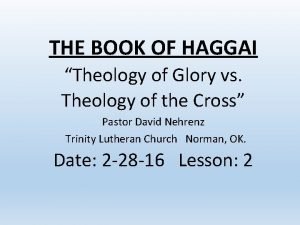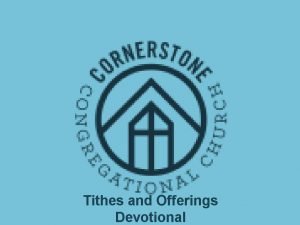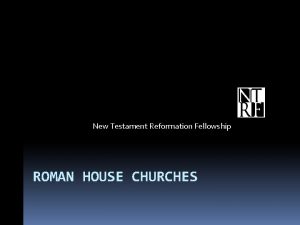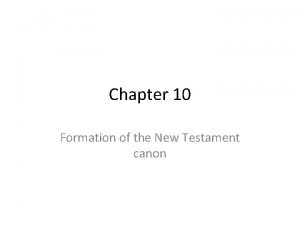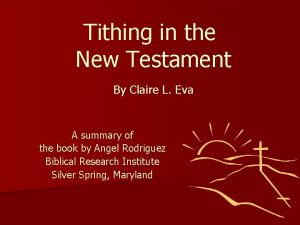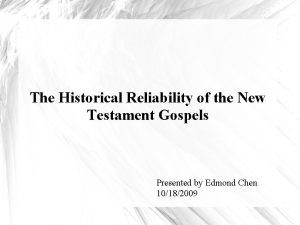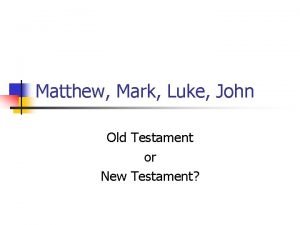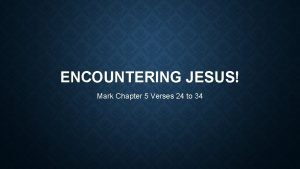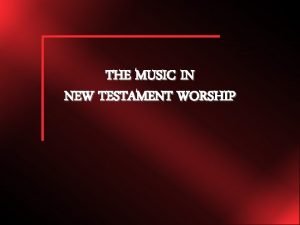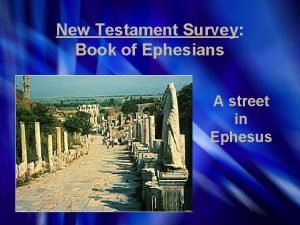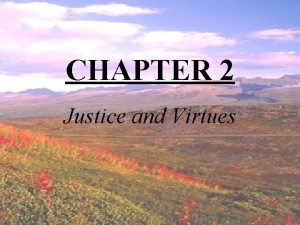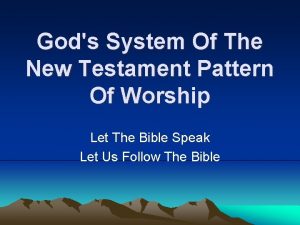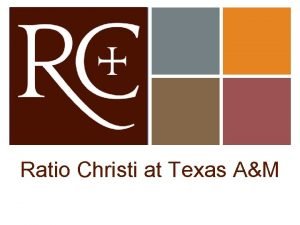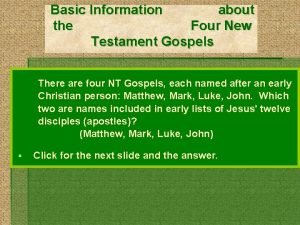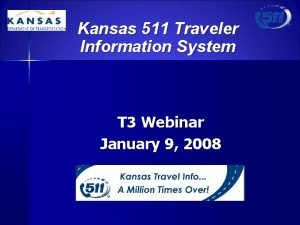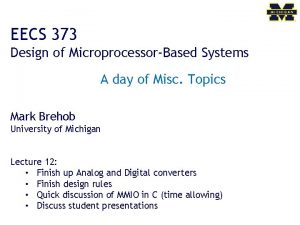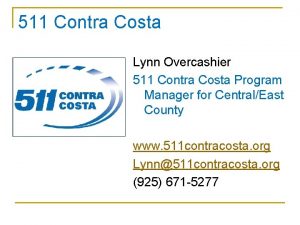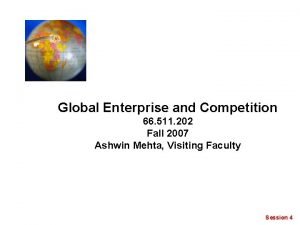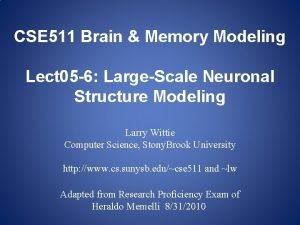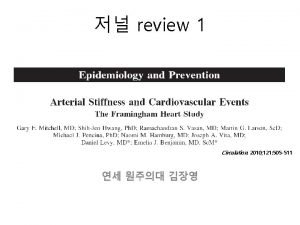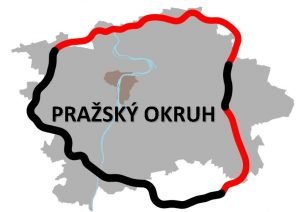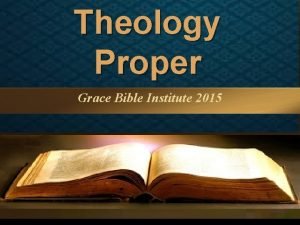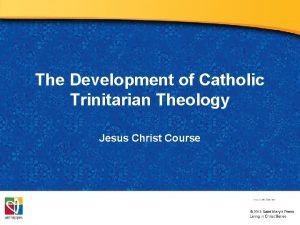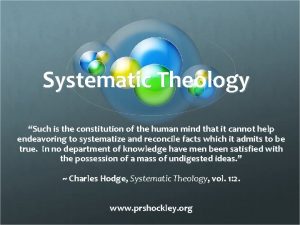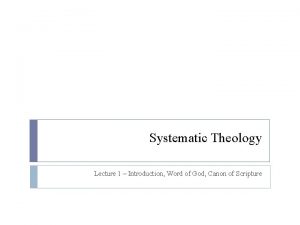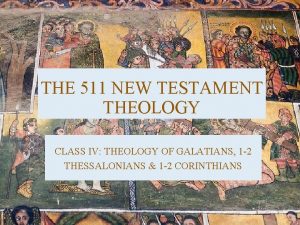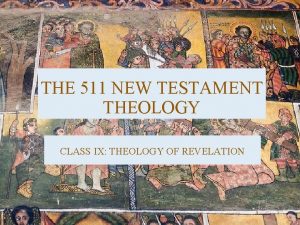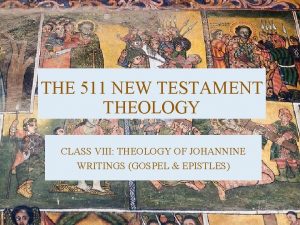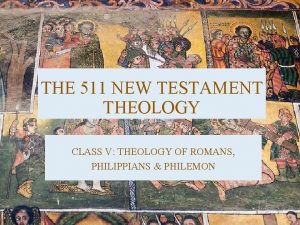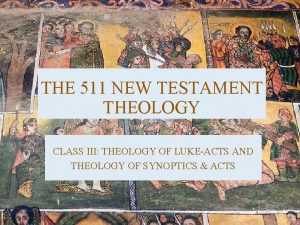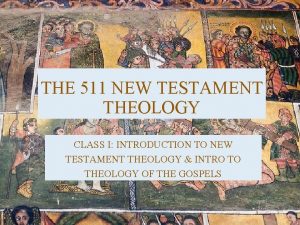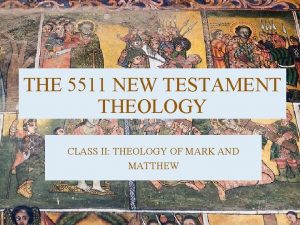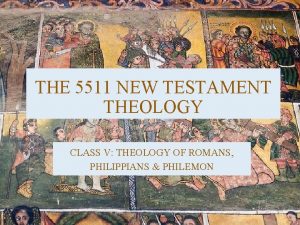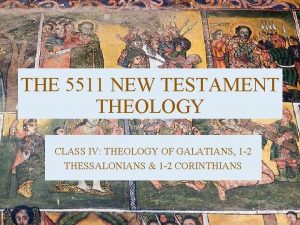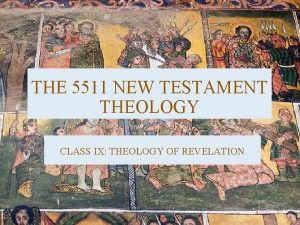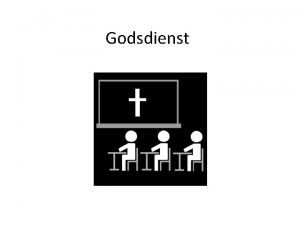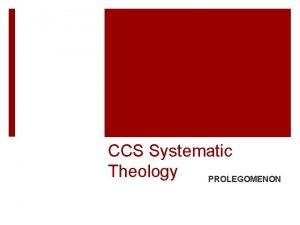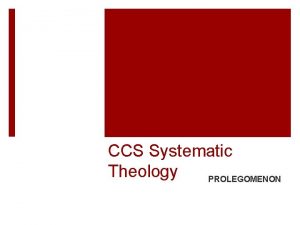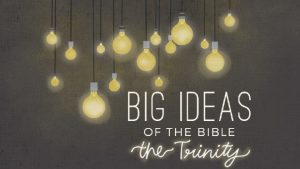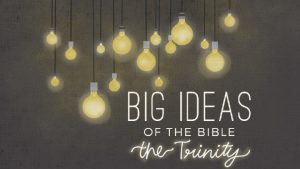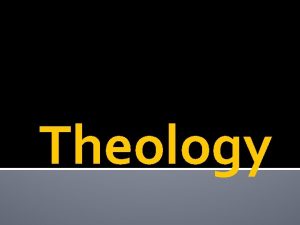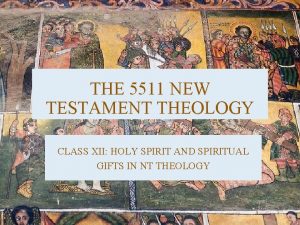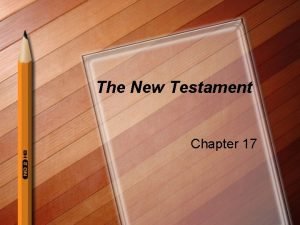THE 511 NEW TESTAMENT THEOLOGY CLASS II THEOLOGY









































- Slides: 41

THE 511 NEW TESTAMENT THEOLOGY CLASS II: THEOLOGY OF MARK AND MATTHEW

THEOLOGY OF MARK & MATTHEW 1. 1 Introduction to theology of Mark • What is meant by gospel? • • • Good news of salvation (Isa 52: 7 + secular usage as good news*) Gospel as kerygma about Jesus Christ (Acts) Gospel as Paul summarized it (1 Cor 15: 1 -8) Gospel as the story about Jesus (Mark 1: 1) Gospel as literary works/genre (canonical Gospels) “The beginning of the gospel of Jesus Christ, the Son of God” • Gospel [good news] about Jesus OR good news that Jesus proclaimed about the kingdom**

THEOLOGY OF MARK & MATTHEW • Gospel about Jesus the Messiah by Mark includes • • • Jesus’ earthy ministry of preaching and healing Announcement of the kingdom Death, resurrection, and parousia How does that compare with Paul’s idea of gospel? (1 Cor 15: 1 -8)

THEOLOGY OF MARK & MATTHEW 1. 2 Theological structure of Mark • Jesus recognized gradually as the Messiah through (Mk 1 -8: 26) • • • Powerful deeds (healing, miracles) Suffering Son of Man & glory (Mk 8: 27 -16: 8) • • • Proclamation & teaching Sayings about coming suffering Death and resurrection Main theological idea: Jesus, the Messiah proclaims and enacts the God’s rule through his life, death, and resurrection

THEOLOGY OF MARK & MATTHEW 1. 3 Theological themes in Mark • Kingdom of God • • Kingdom and the gospel (1: 15) Future reality (9: 1; 13: 25 -26; 14: 25; 15: 43) • “enter the kingdom” “eternal life” “ treasure in heaven” “saved” (10: 17, 21, 23, 26) • kingdom “coming” “waiting” (9: 1; 13: 25 -26; 14: 21; 15: 43)

THEOLOGY OF MARK & MATTHEW • Present reality of the kingdom (Gr. eggiken*) (1: 15) • • Esp. to children, sick, ‘sinners’, poor (2: 16 -17; 10: 15, 21, 46 -52) Healings, exorcisms, overcoming chaos of the nature (3: 22, 27; 4: 40) • Invasion of Satan’s realm God’s activation of His rule over history & creation (cf. Isa 52: 7) • The hidden kingdom - tiny beginnings to great power • • • Seed that growth on its own (4: 26 -29) Mustard seed (4: 30 -32) Coming with glory (14: 61 -62)

THEOLOGY OF MARK & MATTHEW • Kingdom is linked to… • • God & Jesus – his words and deeds “mystery” – not everyone comprehends (4: 11 -12) • • • Suffering Messiah (8: 31; 9: 12; 10: 31, 45) Gradual understanding: personal encounter & following Jesus Kingdom, Jesus’ death & suffering • • God’s rule challenges rule of Jewish leaders (2: 24; 3: 6, 22; 14: 1*) Rome’ rule (5: 9; 12: 17; 15: 1 -4; 26 -27)

THEOLOGY OF MARK & MATTHEW • Christology – Who is Jesus? • • Reader: “the gospel of Jesus Christ, Son of God” (1: 1) • Christ/Messiah (1: 1; 8: 29; 14: 61; 15: 32) “What is this? ” “who can forgive sins? ” “Who is this? ” “who do you say I am” (1: 27, 2: 7, 4: 41, 8: 29) • • Messianic expectations of the time* God’s anointed one through who God establishes the kingdom • • Son of David (10: 47; 12: 35) Messianic secret (see further)

THEOLOGY OF MARK & MATTHEW • Son of God (1: 1, 11; 3: 11; 5: 7; 9: 7; 13: 32; 14: 61; 15: 39) • • • Jesus as Son of God by God (1: 11; 9: 7) & Demons (3: 11; 5: 7) Jesus (12: 6, 36//Ps 110: 1; 13: 32; 14: 61 -62) & Centurion (15: 39) Son of God in the cultural context • • • OT: Israel, angels, kings (Ex 4: 22 -3; Hos 11: 1; Gen 6: 2; 2 Sam 7: 14; Ps 2) Divine man (Gk. theios aner) – e. g. Apollonius of Tyana Roman emperors (Apotheosis & filius deus) – esp. Augustus Mark’s emphasis on “beloved” or unique (1: 11; 9: 7; 12: 6; 14: 36) • Connected w/ exalted Son of Man occupying God’s throne (14: 61 -62)

THEOLOGY OF MARK & MATTHEW • Son of Man – Jesus’ self-reference • • Suffering & death (8: 31; 8: 31, 9: 12, 10: 31, 45; 14: 21 -22) Power, glory & judgment (8: 38, 13: 26, 14: 61 -62) Daniel’s (Dan 7: 13, 10, 26) exalted language (13: 26; 14: 61 -62) • OT & Jewish background (Ps 8: 4; Ezek 33: 2; Dan 7; 1 En 70 -71) • • Traditional ‘Messiah category’ inadequate Son of Man enigmatic for hearers • Per Dan 7: 13 Son of Man possessed authority that is hidden for a time due to the oppression of the enemy – God eventually vindicates • • Jesus’ life: Authority – suffering – glory Authority to forgive, heal, teach, cast out demons – suffering & glory

THEOLOGY OF MARK & MATTHEW • Messianic secret* – why silence about Jesus’ deeds & identity? • • “Say nothing to anyone” (1: 44) Demons know Jesus’ identity (1: 24, 32, 3: 11 -12) Silence (1: 43, 5: 43, 7: 36, 8: 29 -30, 9: 9; cf. 5: 19 -20**) Identity revealed b/f high priest (14: 61 -62; cf. 11: 1 -11) Why? • Some suggestions • • Jesus never claimed to be Messiah/Son of God – later invention Correct mistaken understanding of disciples (cross-glory)*** • • Connection to the mystery of the kingdom Readers know – invitation into mysterious character of Jesus

THEOLOGY OF MARK & MATTHEW • Eschatology – parousia of the Son of Man • Present kingdom & future kingdom • • • Now in partial and hidden way – future in full manifestation Relation to Jesus’ & disciples suffering & glory Seed – stalk – full plant + harvest (4: 26 -9) Eschatological discourse (Mk 13) framed by 8: 38 & 14: 61 Assure audience of God’s sovereign control per prophecy Destruction of the Temple & parousia – one or two occasions? • “When” of the final consummation of the kingdom?

THEOLOGY OF MARK & MATTHEW • “When” of the kingdom enigmatic • • During Jesus’ life time? (9: 1*) “These things…” “This generation”? (13: 30; cf. 13: 32) Need for vigilance (13: 33 -37) • Eschatological discourse – destruction of Temple or parousia? • Beginning of birth bangs (13: 5 -13) • • Suffering, wars, earthquakes, famines, persecution, false Messiahs Abomination of desolation & tribulation (13: 14 -23) “after tribulations” & parousia (13: 24 -27) Be alert (13: 28 -36)

THEOLOGY OF MARK & MATTHEW • • Common scholarly VIEWS: • “coming” of the Son of Man – exaltation & vindication* Two events & prophetic perspective • • Gk. erxomai “going/coming” to God (cf. Dan 7: 13 -14) Kingdom & God’s rule came in power (esp. resurrection)** • All preliminary signs occurred but the final coming of Son of Man (13: 24 -27)

THEOLOGY OF MARK & MATTHEW • Discipleship and response to Jesus • Ambiguity of “following” • • Crowd & degrees of commitment (1: 18; 2: 14 -15; 3: 7; 5: 24; 6: 1) Following as uncompromising attachment (8: 34 -38; 10: 28, 52) • Faith and repentance (1: 15) Discipleship involves suffering, persecution & rejection • Disciples – uncompromising allegiance (8: 34 -38; 10: 28) • • Esp. the 12 (3: 13 -19) Ambiguous nature of the 12 discipleships • • • Leave everything to follow Jesus Listen to Jesus’ private teachings about the mysteries (4: 11) Send out and do miracles (6: 6 -13)

THEOLOGY OF MARK & MATTHEW • Disciples’ failures & “hardened heart” • • • Lack of understanding his teachings (4: 14; cf. 4: 38) Does not understand Jesus’ suffering & death (8: 33, 9: 32, 10: 32 -34) Lack of faith & hardened heart (4: 40; 6: 52; 7: 18, 8: 17 -21) Fight over status (9: 33 -35, 10: 35 -46) Flee during arrest & Peter’s denial (14: 26 -72) Matt/Lk softened the critique (e. g. no hardness of heart) • Why this harsh critique of disciples? • Did the disciples fail?

THEOLOGY OF MARK & MATTHEW • Critique of Mark toward the present leaders of the church? • • Pastoral reasons - better option • • But receive private teaching (4: 11) Sympathy toward failing disciples Identification w/ disciples’ weakness Faithfulness of God and Christ Will the disciples understand after resurrection? (16: 7) • Challenge to the audience

THEOLOGY OF MARK & MATTHEW 1. 4 Conclusion • Main theme: Identity of Jesus and connection to the kingdom • • Jesus the Messiah & Son of God & mighty works + proclamation Suffering and resurrection of the Son of Man Glorious parousia Mystery of the kingdom in the present

THEOLOGY OF MARK & MATTHEW 2. 1 Introduction to theology of Matthew • Matthew’s more complete story • • Genealogy & birth (Mt 1 -2) More extended teachings (five teaching blocks*) Fuller account of death, burial & resurrection (Mt 26 -28) Other distinctive stories, sayings, and parables • • Fulfillment of prophecies more extended Israel & Law Discipleship & church Righteousness of the kingdom

THEOLOGY OF MARK & MATTHEW 2. 2 Theological themes in Matthew • Kingdom of heaven/God • Kingdom of heaven x 32 & of God x 5 (Mk x 14 [cf. Mt 19: 23 -24*]) • • Future (6: 10; 8: 11 -12; 16: 28; 25: 31 -32; 26: 29) Present reality (10: 7; 12: 28; 23: 13) Strong ethical dimension as God’s rule - righteousness Kingdom belongs to… • • • Those who repent and believe (4: 17, 23) Poor in spirit & persecuted for righteousness (5: 3, 10) ‘sinners’ (2: 14; 11: 19); sick (4: 23; 9: 35); poor (11: 5); children (18: 1 -4; 19: 14)

THEOLOGY OF MARK & MATTHEW • Kingdom & understanding* – parables (Matt 13: 1 -44) • • • Wheat and tares Sower; mustard seed; leaven Treasure in field; pearl of great price; dragnet Fulfill Isa 6: 9 -10/Mt 13: 13 -15, 19, 23 Present mystery & call; future manifestation in power • Kingdom as manifestation of God’s grace • • Healings & exorcisms (4: 23 -25; 8: 1 -17, 23 -34; 9: 1 -8, 18 -38) Parables • • • Generosity to undeserving (20: 1 -16) Invitation to all (22: 1 -14) Unexpected arrival (25: 1 -15)

THEOLOGY OF MARK & MATTHEW • Righteousness & Law – demands of the kingdom • • Righteousness – Gk. dikaiosune + cognates (Paul & Matthew) Paul – righteousness as God’s gift • • Right standing (or covenant faithfulness) What about Matthew, righteousness & Law? • • Linked to the kingdom Special theme not found in other gospels Unique meaning and angle different from Paul’s Focus on practical kingdom-behavior demanded of the disciples • Focus on Sermon on the Mt. & connected to Law & prophets (5 -7)

THEOLOGY OF MARK & MATTHEW “Do not think that I came to abolish the Law or the Prophets; I did not come to abolish but to fulfill. 18 For truly I say to you, until heaven and earth pass away, not the smallest letter or stroke shall pass from the Law until all is accomplished. 19 Whoever then annuls one of the least of these commandments, and teaches others to do the same, shall be called least in the kingdom of heaven; but whoever keeps and teaches them, he shall be called great in the kingdom of heaven. 20 “For I say to you that unless your righteousness surpasses that of the scribes and Pharisees, you will not enter the kingdom of heaven. (Mt 5: 17 -20)

THEOLOGY OF MARK & MATTHEW • Is Matthew teaching detailed observance of the Law? • • • More of what Pharisees did? Law in effect for Christ-believers? Law & prophets connected to righteousness (5: 17 -20) • What is the type of righteousness that Jesus demands?

THEOLOGY OF MARK & MATTHEW • Fulfillment of Law & prophets through Jesus’ ministry (3: 17) • • • Fulfillment of OT promises in Jesus’ life (1: 22 -23; 2: 5 -6, 17 -18; 3: 2) Expounded in Sermon on the Mt. (Mt 5 -7) Antitheses - Law & Jesus’ interpretation of Law • Murder – anger (5: 21 -22); adultery – lust (5: 27 -28) Deeper interpretation • Jesus also sets aside commandments (despite 5: 17 -19) • • • Divorce (5: 31 -32; cf. Deut 24: 1 -4) Vows or truthful speech (5: 33 -37; Lev 19: 12; Num 30: 2) Loving neighbor & enemy (5: 38 -43; Ex 21: 24; Lev 24: 20) Be perfect (5: 48; Gk. teleios; cf. 19: 21) Is Jesus “least” in the kingdom? (cf. 5: 19)

THEOLOGY OF MARK & MATTHEW • Righteousness per kingdom… • • To be sought & hungered - perfected in the end (5: 3) Opposed to hypocrisy (6: 1 -4; cf. 23: 23, 27 -28) Connected to Jesus & God’s own righteousness (5: 10 -11; 6: 33) Law & prophets summarized • Golden rule (7: 12) & Great commandment (22: 40) Sermon on Mt. closes w/ “doing Jesus’ words” = wise (7: 24 -27) • Law & traditions of the elders • Traditions of the elders opposed when against Law (15: 1 -11) • • • Ritual purity laid aside? Unclean food allowed? (15: 11) Mercy not sacrifice (9: 13; 12: 7; cf. 5: 23 -24) “weightier & lesser matters” (23: 23)

THEOLOGY OF MARK & MATTHEW • Law & prophets • Radicalized & internalized Challenge to the condition of the heart (5: 8; 28; 6: 21; 11: 29; 12: 34; 13: 15, 19; 15: 18 -19; 18: 35; 22: 37; 23: 1 -4) • Priority on ethical and moral as opposed to ritual (9: 13; 23: 23) • Are “least” commandments still valid? (5: 17 -19; cf. 23: 23) • • • “great and small” - Law as a whole Hyperbolic – importance of authority Salvation-historical aspect – fulfillment (see next slide)

THEOLOGY OF MARK & MATTHEW • What is the timing of the fulfillment of Law & prophets? i. e. “until all is accomplished” • • Starting point in Jesus’ birth (e. g. 1: 22 -23) - Life & teaching (e. g. 8: 17) Two scholarly views of the timing • Law & prophet valid as interpreted by Jesus until parousia • “until heaven and earth pass away” (5: 18; 24: 35) Jesus’ radical reinterpretation of OT functions to the extent that it has not been fulfilled by Christ Righteousness reflects practical conduct of people whose hearts have been transformed by the presence of Jesus & the kingdom Righteousness is God’s own righteousness that is to be sought

THEOLOGY OF MARK & MATTHEW • Valid until Jesus’ death & resurrection (3: 17; 27: 52 -53; 28: 2 -6, 20; cf. 24: 34) • • From Israel to all nations (10: 5 -6; 28: 18 -20) “teaching to obey…what I commanded” (28: 20) • • E. g. baptism replaces circumcision as initiation rite Eschatological signs during death & resurrection (27: 52 -53; 28: 2 -6) • Darkness, earthquake, angel & resurrection Resurrection inaugurates the time of fulfillment – OT now fulfilled though final fulfillment of righteousness awaits Jesus’ second coming (cf. 5: 6) Gracious offer of the kingdom calls for response. This is demonstrated by practical conduct as evidence of transformed heart

THEOLOGY OF MARK & MATTHEW • Kingdom righteousness & God’s initiative • • • Kingdom comes from God & not yet fully present (6: 10) Presence of God in Jesus (1: 23; 18: 20; 28: 19) God’s mercy & generosity • Kingdom is freely available to all – esp. to ‘sinners’ (11: 19) • • • ‘I desire mercy, not sacrifice’ (9: 13; 12: 7) Intimately connected to the person of Jesus Rest and peace (11: 28 -30) Become like children (18: 1 -5; 19: 13 -15) Forgiving and forgiveness (6: 12; 18: 23 -35; 26: 28) Generosity and mercy (20: 1 -16) Kingdom righteousness requires a change of heart

THEOLOGY OF MARK & MATTHEW • People of God – Israel, Judaism & church • Kingdom & new age (10: 1 -16; 11: 13; 12: 41; 13: 17; 28: 18 -20) • Genealogy & fulfillment formula (Mt 1 -2) • • • Embodiment of God’s people (2: 14 -15; Hos 11: 1; 4: 1 -11; cf. 12 disciples) Exclusive mission to Jews (10: 5 -6; cf. 15: 24) – to “all nations” • • Son of David & Abraham – fulfillment of Israel’s scripture (11: 13*) Genealogy; Magi; Syro-Phoenician woman to “all nations” Jewish leaders – opposition to Jesus & kingdom (9: 34; 12: 1 -8) • • • Kingdom taken away, given to others (21: 43; 20: 1 -16; 22: 1 -14)** “cast into utter darkness” (8: 10 -12; 11: 16 -24) Indictment on Pharisees (23)

THEOLOGY OF MARK & MATTHEW • New people of God – Jesus & the 12 disciples • • • 12 disciples & eschatological judgment of Israel (10: 1 -4; 19: 28) Disciples as “children of the kingdom” (13: 38) Gk. ekklesia (only in Matthew) – community of God’s people • • • Established on Peter, 12 & ekklesia (16: 18; 18: 18) Settling disputes & forgiveness (18: 15 -17, 21 -22, 23 -35) Authority & church discipline (16: 17 -19, 18: 18 -20)

THEOLOGY OF MARK & MATTHEW • Who are the people of God per Matthew? • • • Israel lost exclusive status due to rejection of the kingdom People attached to Messiah God’s people – Jews & [future] gentiles Dispensational interpretation • Church as a digression in God’s plan – two peoples of God • • Temporary rejection of Jews Covenant • One people of God throughout salvation history

THEOLOGY OF MARK & MATTHEW • Christology – Who is Jesus? • Center of Matthew’s theology – more explicit Christology • • Son God, Son of Man, Christ/Messiah titles as per Mark Matthew’s emphases & focus • Son of God (3: 17; 17: 5; 16: 16; 27: 54) • • • Through HS at conception (1: 18, 20) Confession by disciples (14: 33; 16: 16; cf. Mk 15: 39) Messiah/Son of David (1: 1, 16 -18, 20; 2: 4; 11: 2; 23: 10) • • Recognized by the marginalized (9: 27; 20: 30 -31; 15: 22; 21: 15) Rejected by leaders (23)

THEOLOGY OF MARK & MATTHEW • Father and Son (7: 21; 10: 32 -33; 11: 27; 12: 50; 15: 13; 16: 17; 18: 10, 19, 35; 20: 23; 25: 34; 26: 29, 39, 42; 53) Unique relationship w/ Father (esp. 11: 27) • Worship of Jesus (2: 2, 11; 8: 2; 9: 18; 15: 25; 20: 20) • Use of Gk. proskyneo [x 13]* 8: 2; 9: 18; esp. 14: 22 -33 (cf. Mk 6: 52); 28: 9, 17 • Exaltation & Trinitarian formula (28: 18 -19) • Immanuel (1: 20 -22; 18: 20; 28: 18 -19)

THEOLOGY OF MARK & MATTHEW • Son of Man • • • Similar to Mark but more sayings Jesus’ rejection (8: 20; 11: 19; 12: 34; 20: 28) Jesus as the glorious Son of Man • • As Judge of the nations - Parable of the sheep and goats (25: 31) Coming & sitting on God’s throne (10: 23; 26: 64; 24: 27 -30)

THEOLOGY OF MARK & MATTHEW • Parousia and Judgment • Emphasis on judgment • Special judgment vocabulary & sayings • Gehenna, eternal fire, judgment, outer darkness, gnashing of teeth (5: 22; 7: 19; 8: 12; 10: 28; 12: 36; 13: 40 -42; 18: 8; 22: 13; 23: 33; 25: 30, 41) • Parables that mention judgment • • • Weeds (13: 24 -30) drag net ( 13: 47 -50) Unmerciful servant (18: 23 -35) virgins (25: 1 -13) sheep & goats (25: 31 -46) Wicked tenants (21: 33 -46) etc.

THEOLOGY OF MARK & MATTHEW • Judgment per Son of Man (25: 31 -46) – righteous & unrighteous • In light of the coming kingdom & accompanying fruit • • Fruit of repentance (3: 7 -10) Doing the will of the Father (7: 15 -27) “Accidental” good and evil deeds to the “least” (25: 31 -46; cf. 10: 42) Importance of vigilance (cf. 24: 48; 25: 5, 19) • • • Faithful slave waiting (24: 45 -51) Virgins prepared (25: 1 -13) Industrious servants expecting return (25: 14 -30)

THEOLOGY OF MARK & MATTHEW • Parousia, destruction of the Temple, and the end • • • Falls Christs, wars, famines, persecutions (24: 4 -14) Desecration of the Temple (24: 15) Flight from the city (24: 16 -22) Messianic pretenders (24: 23 -26) Cosmic signs (24: 29 -30) Only Father known the hour (24: 36) Call for vigilance

THEOLOGY OF MARK & MATTHEW • Conclusion • Framework - overtly concerned with Jewish people • • From exclusive Jewish mission to all nations Main theme • Jesus’ announcement of the kingdom • • Conduct that reflects the righteousness of God & Jesus Focus on radical Torah obedience and love/compassion New people of God (ekklesia) will practice radical righteousness and teach it to others as they wait for the glorious appearance of the Son of Man and the final consummation of the kingdom.

THEOLOGY OF MARK & MATTHEW • Fg
 Theology of glory vs theology of the cross
Theology of glory vs theology of the cross New creation theology
New creation theology Encouraging words for offering and tithes
Encouraging words for offering and tithes House churches in the new testament
House churches in the new testament Tithe in new testament
Tithe in new testament Encountering jesus in the new testament answer key
Encountering jesus in the new testament answer key Encountering jesus in the new testament
Encountering jesus in the new testament The formation of the new testament
The formation of the new testament Tithing in the new testament
Tithing in the new testament Reliability of new testament
Reliability of new testament Test: the general epistles new testament survey
Test: the general epistles new testament survey New testament reformation fellowship
New testament reformation fellowship John old or new testament
John old or new testament Encountering jesus in the new testament
Encountering jesus in the new testament Titus in the bible summary
Titus in the bible summary Instrumental music in new testament worship
Instrumental music in new testament worship New testament survey book
New testament survey book Justice new testament
Justice new testament 27 new testament books
27 new testament books New testament pattern of worship
New testament pattern of worship New testament canon
New testament canon Flesh and bone
Flesh and bone Choose life new testament
Choose life new testament Four new testament gospels
Four new testament gospels Royaume de clovis en 511
Royaume de clovis en 511 Kansas 511
Kansas 511 Eecs 373
Eecs 373 Nnn-511
Nnn-511 Kev 775
Kev 775 511
511 Goroo trip planner
Goroo trip planner Cse 511
Cse 511 Adw 511
Adw 511 Circulation 511
Circulation 511 Stavba 511
Stavba 511 Sokp 511
Sokp 511 Define theology proper
Define theology proper What is theology proper
What is theology proper Theology and falsification
Theology and falsification The development of catholic trinitarian theology
The development of catholic trinitarian theology Define systematic theology
Define systematic theology Theology proper lecture notes
Theology proper lecture notes
